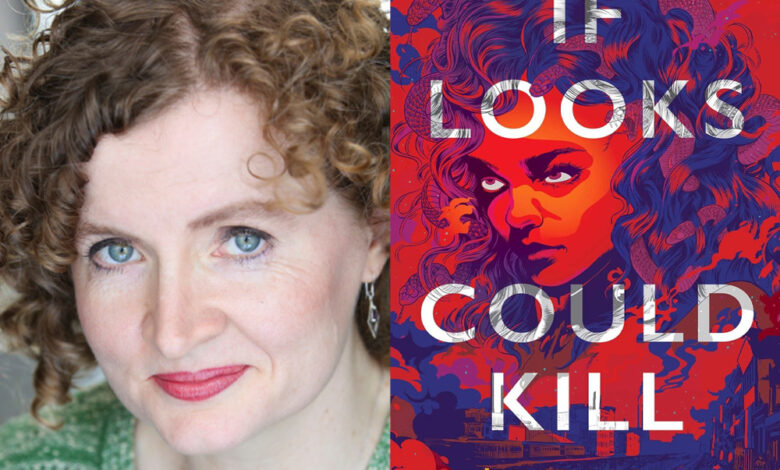Q&A: Julie Berry, Author of ‘If Looks Could Kill’

We chat with author Julie Berry about If Looks Could Kill, which is a true-crime-nail-biter-turned-mythic-odyssey pitting Jack the Ripper against Medusa. A defiant love song to sisterhood, a survivors’ battle cry, and a romantic literary tour de force laced with humor.
Hi, Julie! Welcome back! It’s been five years since we last spoke for the release of Wishes and Wellingtons. How have you been and what have you been up to?
Hi there! Thanks for inviting me back. A lot has happened since then – some new picture books (Cranky Right Now and The Night Frolic), two sequels to Wishes and Wellingtons (Crime and Carpetbags and Burglars and Bluestockings); a new bookstore (I bought an indie bookstore and recreated it as Author’s Note) and now, a new YA thriller that combines historical fiction, myth, and true crime, called If Looks Could Kill.
Quick lightning round! Tell us:
- The first book you ever remember reading: Caps for Sale by Esphyr Slobodkina
- The one that made you want to become an author: The Chronicles of Narnia; Little Women; Anne of Green Gables. The usual suspects. 😉
- The one that you can’t stop thinking about: Probably the book that as a teen invaded my consciousness the longest and really cemented the dream of wanting to become an author was Beauty by Robin McKinley.
Your latest novel, If Looks Could Kill, is out September 16th! If you could only describe it in five words, what would they be?
Medusa versus Jack the Ripper.
Also:
Fierce, frightening, freeing, funny, & female.
What can readers expect?
Readers can expect another deeply researched Julie Berry historical fiction novel that takes, true to form, a twist toward the mythical and the mystical; what’s new this time is bringing true crime into the mix. This is a tale of sisterhood and survival at its most stubbornly resilient, in the face of a climate and society that treat women’s bodies as commodities, a context which produces both widespread exploitation and, in one dangerously warped mind, a serial butcher of women. Two young women, Tabitha and Pearl, both volunteer “soldiers” with the Salvation Army, have come to New York City to try to do something about the suffering and poverty they find there. Motives that start out religiously based are quickly challenged when they confront the vice and squalor there, and even more so when young women they know are swallowed up by a brothel and the city is set on edge by the possible arrival of a fugitive Jack the Ripper.
Where did the inspiration for If Looks Could Kill come from?
Medusa vs. Jack the Ripper sounds, no doubt, like an unlikely pairing, but I’d already been working on a Medusa-in-the-Bowery story angle when Jack the Ripper slunk in, or rather, when I learned that a credible suspect in the Whitechapel murder investigations fled London, dogged by London detectives, and holed up in the Bowery for a while before giving detectives the slip. Truth really is stranger than fiction. Both Medusa and Jack the Ripper are enigmas of mythic stature, even though one is a real person, and both center around violence against women. A grudge match between them felt very fitting.
Were there any moments or characters you really enjoyed writing or exploring?
I can’t say that I enjoyed Jack, inasmuch as he is a despicable human being, but writing his scenes was fascinating from a creative perspective. But I especially loved writing Pearl and Tabitha, and the unfolding relationship between them that moved from absolute enemies to fiercely loyal companions. The chapter that moved me most was called, “What We Owe a Body.”
Did you face any challenges whilst writing? How did you overcome them?
The challenge for me was writing about Jack’s perspective in a cold, unsentimental way, so was to avoid glorifying or romanticizing him, yet making him believable as a person with motivations that made logical sense to him; and to write about young women facing horrific dangers without letting the novel sink into a sense of hopelessness. I think that’s one of the novel’s themes at its core. Those who use violence against women to control them count upon hopelessness and despair making them more compliant and dispirited. The bravest form of resistance is to soldier on with courage and with love for yourself and others. That’s what these mighty girls, Pearl and Tabitha, do, along with friends they make along the way.
What’s next for you?
I’m heading out on what I’m calling a “Monster Tour” this September, inasmuch as Medusa is a monster and as I’ll be visiting 29 indie bookstores and libraries all around the country in about a 6-week period. I’m wildly excited. While this is happening, on planes and in airports, etc., I’m working on revisions to a middle grade project and getting my next YA off and running. Stay tuned!
Lastly, what books have you enjoyed reading this year? Are there any you’re looking forward to picking up?
One of my favorite new reads this year is called The Tainted Cup, the first in a series of fantasy murder mysteries by Robert Jackson Bennett. The sequel, A Drop of Corruption, did not disappoint. Owning a bookstore is a bit like owning a firehose where new books are concerned. I don’t know how to keep up with all the goodness coming down the pike!
Will you be picking up If Looks Could Kill? Tell us in the comments below!
Source link
